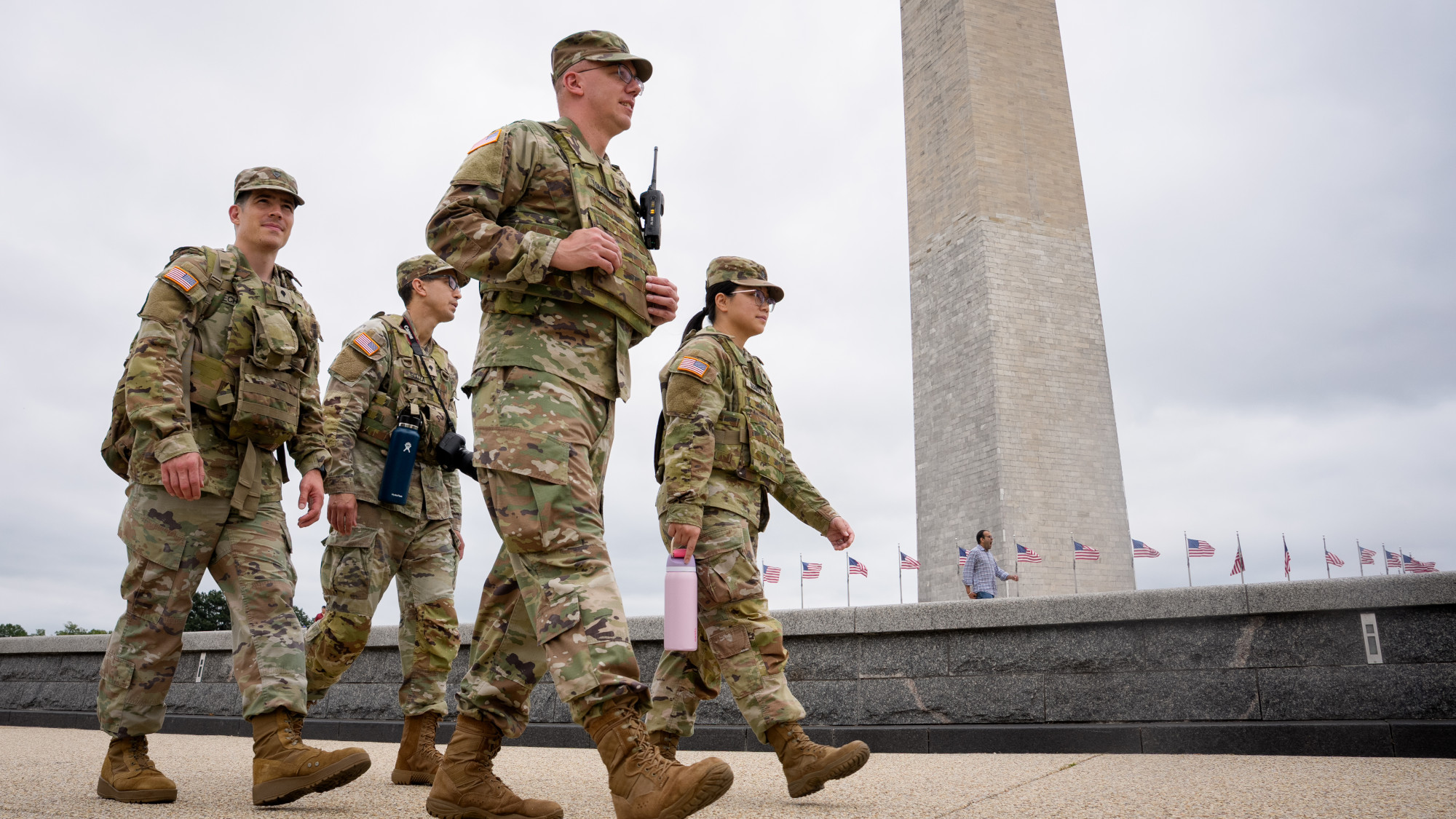Red states join in Trump's D.C. crackdown
1,200 troops arrive in Washington D.C. from six red states

A free daily email with the biggest news stories of the day – and the best features from TheWeek.com
You are now subscribed
Your newsletter sign-up was successful
What happened
Six Republican governors announced this week they were sending National Guard soldiers to bolster President Trump's direct, militarized control of Washington, D.C., streets. The president had previously deployed 800 D.C. National Guard troops, federalized the 3,200-member D.C. police force, and surged federal officers from the FBI, ICE, DEA, and other agencies into the city. The deployment of some 1,200 troops from GOP-led states—Ohio, Mississippi, South Carolina, Tennessee, West Virginia, and Louisiana—is a significant escalation of that effort. Mississippi Gov. Tate Reeves justified his sending of troops by saying that crime in the nation's capital was "out of control," although the homicide rate in his own state capital, Jackson, was triple that of D.C. in 2024. D.C. Mayor Muriel Bowser said violent crime in her city was at a 30-year low. "This is not about D.C. crime," she said. "The numbers don't support 1,000 people from other states coming to Washington."
After the first week of federalization, the D.C. Police Union reported that crime was down 8% and violent crime was down 22%, while the White House reported more than 450 arrests and the clearing of nearly 75 homeless encampments in the first week of federalization. That was a bit lower than the 475 arrests a week typical before the takeover—and 40% of the federal arrests were for immigration violations, which local police don't typically enforce. It's unclear how long the federal forces will remain in the city. A 1973 law limits the president to 30 days of direct control of the D.C. police during emergencies, but that does not cover deployments by the National Guard or by federal agencies.
What the columnists said
There is "no legitimate reason" for Ohio to be sending any of its National Guard to D.C., said the Toledo Blade in an editorial. Soldiers are trained to kill the enemy, not police Americans. Ohioans well know how such a deployment can turn out: When National Guard troops were sent to quell anti-war protests at Kent State in 1970, they ended up killing four students. The massacre is "one of the worst memories in state history." It should stand as a "permanent lesson on the misuse of military power."
The Week
Escape your echo chamber. Get the facts behind the news, plus analysis from multiple perspectives.

Sign up for The Week's Free Newsletters
From our morning news briefing to a weekly Good News Newsletter, get the best of The Week delivered directly to your inbox.
From our morning news briefing to a weekly Good News Newsletter, get the best of The Week delivered directly to your inbox.
The D.C. crime rate is clearly just a pretext for what is essentially a "military occupation," said Jamelle Bouie in The New York Times. The troops haven't been sent to "any of the city's high-crime areas," where extra policing might conceivably be useful. Instead, they have parked Humvees on the National Mall and erected menacing checkpoints near U Street restaurants, hurting local businesses. This isn't about public safety. It's about showing D.C. residents that they are not "equal citizens under an elected government," but rather "subjects of a capricious ruler." If they reject Trump's demands for loyalty, he will "send an occupation force, with support from regime-friendly governors."
Scrambling "to downplay D.C.'s unacceptable level of crime looks, frankly, ridiculous," said Becket Adams in National Review. The homicide rate is "nearly six times the rate in New York City," and carjackings got so bad in 2023 that police were handing out free tracking tags so you could find your car after it was heisted. Democrats' "smug, reflexive opposition" to enforcing the law will only backfire on them. Voters want law and order, and if Trump's federal takeover shows that "the federal government can in fact" deliver, they will ask for more.
But the point of this deployment isn't actually to bring down crime, said Andrew Egger in The Bulwark. Trump wants to convince Americans that violent disorder is everywhere, and that's why federal troops must be everywhere, too. "The goal isn't quiet on the D.C. streets. It's making something new for the content beast: video of clashes between masked cops and D.C. residents" for everyone to see as they scroll on their phones.
D.C. may be "a dry run for other cities," said Margaret Talbot in The New Yorker. "You look at Chicago, how bad it is," Trump said last week. "New York has a problem." Militarized police and troops on the street "are uniquely chilling to the exercise of assembly and free speech," but the president wants Americans to increasingly accept that as a normal, necessary evil. When Trump tells his enforcers they can "do whatever the hell they want," that's not strictly, legally true. "But it's truer than it used to be."
A free daily email with the biggest news stories of the day – and the best features from TheWeek.com